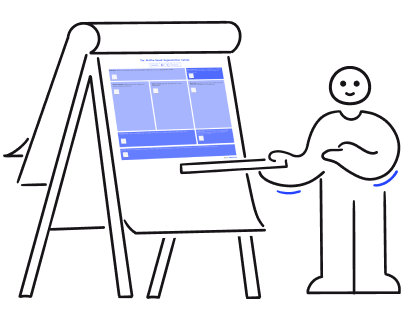At the top of the list of HR hot topics these days sits the whole concept of Industry 4.0, which represents a major transformation in the way companies approach their business practices. This fourth industrial revolution has already reduced the need for a human resources department within many companies through automation and process optimization. Although the needs are constantly changing, the relevance of valuing the human beings within a company is not becoming any less important.
Empower your organization with the skills-based canvas.

What's in this article
- Traditional HR vs HR 4.0
- Will industry 4.0 cause job losses?
- Will the employer's role change in the organization?
- HR departments must adjust to industry 4.0, and fast
- The HR expert role in organizations is not limited to finding and hiring good talent.
- Adopt the HR industry 4.0 mindset and framework
- Get employees on board
- Prepare contingency plans
- Invest in training and new human resource management practices
- Workleap LMS is the perfect tool for your HR
What are industry 4.0 human resources?
The idea behind HR 4.0 is similar to the idea behind Industry 4.0, which is known as the fourth industrial revolution. This revolution doesn’t only affect the manufacturing sector, it also changes the methods used in offices. As Industry 4.0 represents an important change in the way companies operate, it is also true to say that it has changed human resources requirements, especially through automating tasks.
Much of the technology needed for HR-related tasks is already in use today. As a result, human resources become more automated, concentrating their activities on strategic matters and not on manual, bureaucratic and repetitive tasks. With the rise of social media, we've seen the emergence of new technologies such as eSocial, which has forced companies to change their ways of doing business. Human resources management plays an important role in industry 4.0, but the impact of industry 4.0 is undeniable.
Traditional HR vs HR 4.0
Unlike traditional Human Resources which focused mainly on paying employees' wages and controlling their working hours, HR role in industry 4.0 is focusing on frontiers such as attracting qualified talent, improving organizational climate, and other ways that directly contribute to the organization's strategic goals.
HR Industry 4.0 is permeated by technology and fits into new labor market situations - with special influence from the Millennials who reach leadership positions in organizations, and the others that follow them. For professionals in industry 4.0 who want to be successful, it is essential to keep up with technological advances so that they remain competitive.
With the traditional personnel departments leaning towards strategic human resource management, companies have already realized that their main asset is humans. They also understand that the technologies they develop themselves, or buy from third-party vendors for reasonable prices, allow automatizing bureaucratic processes.
The new reality of HR industry 4.0 is an opportunity to improve our quality of life as HR experts.
Often working with the odds against us, the digital transformation might turn out to be a much-needed disruptor in the sector. While managers are increasingly alert to the impending business decisions that need to be made in the coming years, much of the technology is already available to optimize all current human resources activities.
The impacts of industry 4.0 on human resource management
Nobody can know for sure what will happen when companies will need fewer human resources to function. However, we are confident that the work of human operator experts will be radically different and that our practices will need to be modernized. Since we can't stop the inevitable, let's see how you, as an HR expert, can leverage technology to make it a strategic lever for your practice. Here are some examples of the effects of Industry 4.0 on many business models.
HR is about getting the best performance out of people
At its simplest, the digital transformation is not about eliminating employees, but about maximizing their importance in a company's production chain and the retention of jobs. Fewer people with more value and greater purpose is the new challenge of human resource management. While it is true that labor scarcity is a limiting factor in the growth of current businesses, the digital transformation can be perceived right now as one of the many strategic approaches for long-term business projects and growth strategies.
Learn how to measure your employee productivity.
Will industry 4.0 cause job losses?
Let's be honest and address the elephant in the room. Yes, some employees will find that their knowledge, skills and abilities will no longer be required. Although this may seem to be a negative thing, the big picture is much more positive when we keep in mind that we are in a context of full employment. There is literally no better time than now for these workers to change careers. Meanwhile, people who remain employable will have changing expectations regarding their terms of employment and working conditions.
Will the employer's role change in the organization?
HR industry 4.0 will also come in the form of development opportunities and managerial challenges, to remain up to date on the new trends and realities of any sector. Developing key soft skills such as leadership will become essential for a successful change management.
The changes resulting from this transition will require the employer to play a vital role towards continuous education of its workforce and provide tools, along with a solid learning structure, to facilitate lifelong learning for all employees. To remain competitive while maximizing every dollar invested in training, the onboarding training program must be accessible and easily kept up to date by human resources management.
Will human resources remain an important factor in the industry 4.0 business environment?
This new automation culture, just like the progressive implementation of new technologies, is changing the needs of organizations. Business owners and executives will need to quickly re-evaluate their business model and review the organizational roles in future studies to identify strategic roles in industry 4.0 requiring human involvement. As a result, it will be imperative to adjust their recruitment practices. In other words, as you face the challenge of reinventing the human resources role within an organization, you will also need to deal with employers, employees and partners who are also experiencing major changes in their professional lives themselves.
By keeping a strong focus on the needs of employees rather than sticking to the rigid processes in place, industry 4.0 HR will play a critical role in reaffirming the relevance of HR position in this time of change.
The human resources recruitment challenges in industry 4.0
The transition to Industry 4.0 requires the active participation of all within a business. As this transformation calls for a reset within your HR department, your recruitment processes are no different from the rest and will need to be rethought.
HR departments must adjust to industry 4.0, and fast
If internal HR teams and agencies fail to adapt to the new processes of industry 4.0, they will lose their competitive advantage. To continue to find the best talent for the jobs available, you will have to accept and learn to deal with this evolution. The access to new data may help recruiters better understand what makes a company attractive to certain candidates.
As a result, HR managers will be able to put into action different measures to nurture and control the outside perception of your business culture and corporate values. As you become more proficient with applications to find suitable candidates, you can help reduce recruitment costs and job opening delays. The adoption of the RH 4.0 methods gives you the opportunity to create employment opportunities with sustainable potential for you and your company.
HR management still relies on collaboration and collective knowledge
Traditionally, every HR task within an organization was performed by an internal team, or subcontracted to external agencies. To help various departments coordinate their activities, HR professionals will now need to become familiar with new technologies and use them to work more effectively. This involves the use of collaborative tools, communication, as well as the preservation of digital archives and protocols.
The HR expert role in organizations is not limited to finding and hiring good talent.
Human resources’ role goes beyond the recruitment process: it also involves other tasks such as integration and training. For starters, you can:
- Automate and personalize the onboarding experience of new employees.
- Improve your employer's brand while significantly reducing the learning curve for a new employee.
- Develop in-house training programs and continuous skills' development using new technologies.
For example, a tactic such as creating learning content using your veterans (collective knowledge) can motivate workers to maintain a high level of skill, while valuing their jobs. It also generates engagement and pride for any employee involved in the process. Many enterprise learning management systems, such as Workleap LMS, allow workers to study and learn new skills according to their own schedule, using their mobile device.
How can human resources stay relevant in industry 4.0?
Adopt the HR industry 4.0 mindset and framework
It is important to help HR professionals embrace the digital transformation by creating an environment where they feel comfortable experimenting and innovating. If they don't, they might become resistant to change and refuse to adopt the new practices in industry 4.0.
First, show them the new trends in your industry; if necessary, give them suggestions to implement these trends. Then, understand their current leanings, so they can help you create an effective plan.
Get employees on board
The most important thing for HR will be to communicate clearly to both staff members and management alike about the changes that automation and digitalization will have on their jobs, and to ensure that they're aware of these changes. If people are open to the idea of automation and digitization, then it will be easier for the HR to introduce them into the workplace.
Prepare contingency plans
We have often thought about how HR should be a strategic business ally to organizations. But beyond being a strategic business ally, HR must also become a contingent champion. That means that the HR policies, practices and procedures will have to be more agile, adaptive and flexible to prepare for whatever contingencies employees and the organization might face both inside and outside the workplace. From shifting from physical to remote working arrangements, to retraining employees to operate machinery in a virtual environment - it's essential to be ready. HR needs to build resilience and flexibility to thrive in an environment where things constantly change.
Invest in training and new human resource management practices
One of the most important aspects of human resource management is ensuring that staff receives adequate skill development and continuous learning. To achieve this, HR should ensure that they invest in both short term and longer-term learning activities, including providing access to relevant information through online courses and seminars. They can also work closely with educational institutions to offer flexible study options, such as distance learning, eLearning, blended learning, and face-to-face learning. In addition, HR should consider investing in professional development and creating an environment where staff feel comfortable asking questions about how best to utilize new developments.
Does human resources still have their place in industry 4.0? Absolutely
The digital transformation is already at the root of many changes in the business world, and many changes are still underway. As an HR professional, it is your job to anticipate, research, and propose new technologies and techniques that will help you work more efficiently and intelligently.
Part of your job will be to discover and meet the changing needs and expectations of your clients and recruits. In addition, you can expect the new industrial revolution to open up new opportunities for performance management and continuous training, which will help you stay relevant to the employers and employees you serve every day. In a world where we must constantly reaffirm our value within a company, your position as human resources professionals will be solidified by focusing on the development of your employees' skills, on the optimization of human roles with added-value and by proving the multiple gains in efficiency, established with your financial director.
Workleap LMS is the perfect tool for your HR
Essentially, your job is to cultivate happy people, in an environment where everyone understands the importance of their individual contribution, to the benefit of collective success. Workleap LMS believes that working with the right tools can make a huge difference in the transition towards industry 4.0, both for your employees and your HR department. We are proud to offer SMBs the onboarding and training platform and resources they need to succeed!
Discover, manage, and grow your team’s skills to unleash their potential and retain your rising stars.




